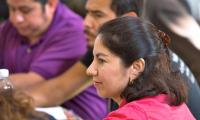Priest Says Call To New Evangelization Long A Part Of Hispanic Ministry
ST. AUGUSTINE, Fla. (CNS) -- Pope Francis' call for mission and the church's emphasis on the new evangelization always has been in "our inner language," Father Raphael Capo said about leaders of Hispanic ministry.
"Maybe now as we work together in this context of cultural diversity in the church, it becomes ever more important,” said the Piarist priest, who heads the Miami-based Southeast Pastoral Institute, or SEPI.
Father Capo was among about 150 participants representing 16 dioceses and 17 nationalities from throughout the Southeast who gathered in St. Augustine Oct. 17-20 for a regional encounter.
The leaders in Hispanic ministry came together to share their pastoral and communications strategies -- including many social media and Internet-based tools -- and to take up the challenge to help step up the pace and effectiveness of Hispanic church leadership across the country.
The regional encounter, or encuentro, marked the 35th anniversary of the institute, known in Spanish as Instituto Pastoral del Sureste. The event also was a precursor to the fifth national encuentro to take place in 2016.
Father Capo told The Florida Catholic, Miami's archdiocesan newspaper, that the institute is "excited to begin new partnerships and programs for evangelization and faith formation." During the regional encuentro, the institute launched a new online Spanish-language formation program with the University of Notre Dame.
"The pilot program has proven to be very well accepted by our communities," he added.
The priest and a number of other leaders shared their comments on the state of Hispanic ministry in the church today in interviews.
Deacon Juan Carlos Pagan, a program coordinator in Hispanic ministry for the Diocese of Lafayette, La., echoed some of Father Capo's remarks.
"The new evangelization may seem new in the American setting, but this is old news for SEPI and the way that SEPI works," he said. "When I was a kid, it was instilled in us that you get out and look for people -- it is not enough only to be welcoming."
Deacon Pagan said that in his diocese, the sense of community among Hispanics "is the result of a little mobile team that SEPI had that went knocking on doors, found some Hispanics, gathered them together and had a Mass."
It slowly grew because Piarist Father Mario Vizcaino, the institute's founding director, "took the initiative to drive 700 miles to find the Hispanics. One-on-one contact is still a most effective way to invite people to church."
For decades, Father Vizcaino helped nurture ministry initiatives and educational programming in support of Hispanic church life in nine U.S. states. Father Capo succeeded him as the institute's director when he retired in 2012.
A number of ministry leaders, such as Eva Gonzalez from the Archdiocese of Louisville, Ky., emphasized the use of media in all forms to reach Hispanic Catholics of all backgrounds and evangelize the wider community.
Twitter, Facebook, emails and a Spanish-language digital version of the archdiocesan newspaper, The Record, said Gonzalez, director of Hispanic ministry. "And sometimes personal phones calls or meeting in person is still the best thing," she added.
"We need to see more Hispanics in the seminaries and in the convents," said Gustavo Valdez, director of Hispanic ministry for the statewide Diocese of Charleston, S.C. "The bishops get seminary candidates from families and we as laypeople have the responsibility to do our job to promote vocations from within our families and send those vocations to the bishop."
Catholic leaders in Charleston are currently working on "our diocesan pastoral plan ... addressing faith formation, sacrament participation, vocations and how we Hispanics relate to other organizations in the community," he added.
Olga Lucia Villar said, "Nowadays the Hispanic community has more awareness of being prepared (for ministry) and willing to organize ourselves. That has come about recently."
She is director of Hispanic ministry for the Archdiocese of Mobile, Ala.
"Thirty five years ago, this was unthinkable when Father Mario Vizcaino first went around meeting the Mexican people in the communities of the South," Villar said.
"Today we know we are a growing minority and there is a commitment to get the tools to lead. ... We have mission territory here (in the South) and we need missionaries to respond to the calling," she added.


